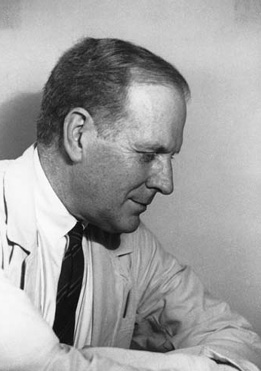 JAMES B. MURPHY, Med 1909, was a pioneer in cancer research at the Rockefeller Institute in New York from 1910 until his death in 1950. Known as a natural leader, he achieved excellence in his own research even as he encouraged excellence in others. Chief members of the department he led included Albert Claude and George Palade, who both won the Nobel Prize in 1974, and Keith Porter, among the most important founders of the field of cell biology. Dr. Murphy was an associate of Peyton Rous, Med 1905, and shared in the discovery of the cancer virus of chickens, for which Dr. Rous won the Nobel Prize in 1966. Dr. Murphy published many papers showing that the lymphocyte was responsible for resistance to tuberculosis and cancer, as well as for the rejection phenomenon against transplanted tissue. This work was summarized in Rockefeller Institute Monograph No. 21, published in 1926. In the 1930s, his research concluded that cancer was caused by a somatic mutation and that the Rous virus was best thought of as a transmissible mutagen.
JAMES B. MURPHY, Med 1909, was a pioneer in cancer research at the Rockefeller Institute in New York from 1910 until his death in 1950. Known as a natural leader, he achieved excellence in his own research even as he encouraged excellence in others. Chief members of the department he led included Albert Claude and George Palade, who both won the Nobel Prize in 1974, and Keith Porter, among the most important founders of the field of cell biology. Dr. Murphy was an associate of Peyton Rous, Med 1905, and shared in the discovery of the cancer virus of chickens, for which Dr. Rous won the Nobel Prize in 1966. Dr. Murphy published many papers showing that the lymphocyte was responsible for resistance to tuberculosis and cancer, as well as for the rejection phenomenon against transplanted tissue. This work was summarized in Rockefeller Institute Monograph No. 21, published in 1926. In the 1930s, his research concluded that cancer was caused by a somatic mutation and that the Rous virus was best thought of as a transmissible mutagen.
James B. Murphy Professorship in Oncology
School of Medicine
Oncology
Established in 2000 by anonymous donors in memory of James B. Murphy
Held by Richard F. Ambinder
 RICHARD F. AMBINDER, Med 1979, 1989 (PhD), the James B. Murphy Professor of Oncology, directs the Division of Hematologic Malignancies in the Department of Oncology and the Viral Oncology Program at the Comprehensive Care Center at Hopkins. A member of the faculty since 1984, Dr. Ambinder’s research focuses on Epstein-Barr virus and malignancy. Epstein-Barr virus is consistently found in association with a variety of tumors including African Burkitt’s lymphoma, nasopharyngeal carcinoma, mixed-cellularity Hodgkin’s disease, post-transplant lymphoma, and AIDS central nervous system lymphoma. His studies are aimed at better defining the role(s) of the virus in the pathogenesis of these diseases and this development of strategies to diagnose and treat these malignancies.
RICHARD F. AMBINDER, Med 1979, 1989 (PhD), the James B. Murphy Professor of Oncology, directs the Division of Hematologic Malignancies in the Department of Oncology and the Viral Oncology Program at the Comprehensive Care Center at Hopkins. A member of the faculty since 1984, Dr. Ambinder’s research focuses on Epstein-Barr virus and malignancy. Epstein-Barr virus is consistently found in association with a variety of tumors including African Burkitt’s lymphoma, nasopharyngeal carcinoma, mixed-cellularity Hodgkin’s disease, post-transplant lymphoma, and AIDS central nervous system lymphoma. His studies are aimed at better defining the role(s) of the virus in the pathogenesis of these diseases and this development of strategies to diagnose and treat these malignancies.